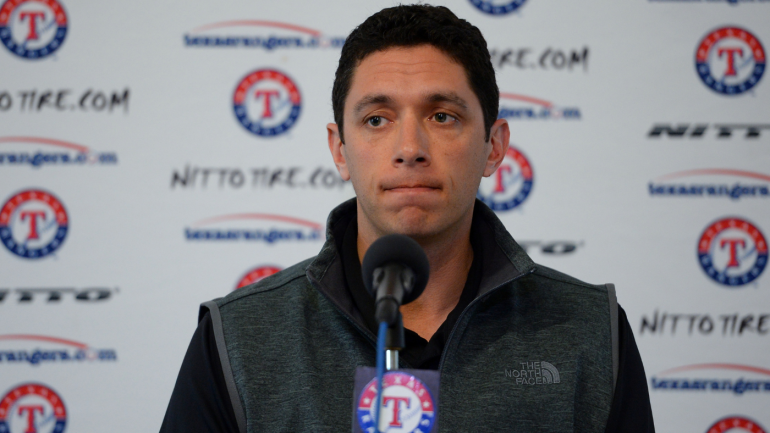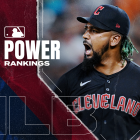
The Texas Rangers fired longtime executive Jon Daniels on Wednesday, ending his nearly 17-year run atop the organization's baseball operations department. Earlier this week, the Rangers had dismissed manager Chris Woodward, who was in the midst of his fourth season at the helm.
Whereas Woodward's time in Arlington felt fleeting, a grain of sand on the beach, Daniels' Rangers tenure felt like … well, the beach itself. He became the youngest GM in the sport's history when he was appointed as a 28-year-old in 2005. He departed the organization on Wednesday a week shy of his 45th birthday. In between, he became synonymous with the Rangers in a way that's been achieved by few other modern executives. To wit, the only surviving general managers to be hired by their current teams before 2010 are Brian Cashman (New York Yankees) and Mike Rizzo (Washington Nationals), and the latter could be jeopardized by an upcoming ownership change.
Unlike Cashman and Rizzo, Daniels never did win a World Series title. He did shape the Rangers into a powerhouse, winning 90 or more games five times between 2010-16. They won consecutive American League pennants in 2010-11. At that point, they were the envy of the league: blessed with a big-league roster, farm system, budgetary outlook, and front office so good that they had intelligent scribes wondering what, precisely, it would take for their dynasty to fall. "Misfortune falls on even the good, and this won't last forever," Sam Miller wrote about the Rangers in May 2012. "It might last darned near forever. But it won't last forever."
It did not last forever, or even close to it. The Rangers have won just two playoff games (and zero series) since Miller published his article. In recent years, the Rangers have struggled to remain relevant. Their last winning season came in 2016, and a bold winter that saw them sign top free agents Corey Seager and Marcus Semien has not changed their fortune. As of Wednesday, Texas is on pace for a 73-win season.
What caused Daniels and the Rangers to fall from glory? Post hoc analysis always carries with it the benefit of hindsight, but league sources who spoke to CBS Sports on Wednesday identified three key factors behind Texas' descent.

CBS Sports HQ Newsletter
Your Ultimate Guide to Every Day in Sports
We bring sports news that matters to your inbox, to help you stay informed and get a winning edge.
Thanks for signing up!
Keep an eye on your inbox.
Sorry!
There was an error processing your subscription.
1. Farm system failures
It's nearly impossible for an outsider to suss out what farm system problems stem from poor drafting and evaluation versus poor development and instruction. Whatever the cause over the past decade, the effect for the Rangers was a farm system that didn't produce as many talented players as was expected based on public analysis.
Put another way, the Rangers drafted Joey Gallo with the second of their three first-round picks in 2012. He would go on to have a good career in Texas before he was shipped to the New York Yankees at the 2021 trade deadline. The Rangers' 15 subsequent first-round picks have combined for negative Wins Above Replacement, according to Baseball-Reference's calculations. What's more is that only one of the 15 has tallied so much as a single Win Above Replacement in the majors, and that individual (Dillon Tate) did all the producing with another organization.
The Rangers have picked in the top 10 in three of the last four drafts and thus far have nothing to show for it. Third baseman Josh Jung (No. 8, 2019) has spent the season recovering from shoulder surgery; right-hander Jack Leiter (No. 2, 2021) has walked more than five batters per nine in his first 18 professional starts; and fellow righty Kumar Rocker (No. 3, 2022) was considered a reach by scouts and analysts with other organizations who wondered how he improved his stock so much in a year he barely pitched.
Those three selections could end up paying major dividends in due time, but the Rangers' inability to get the most of their young talent dates back a decade. Jason Parks, now an assistant GM with the Arizona Diamondbacks, wrote in February 2013 that the Rangers system was "absolutely loaded with high-ceiling talent." At the time, the Rangers' prospect crop included Jurickson Profar, Mike Olt, Martín Pérez, Jorge Alfaro, Lewis Brinson, Nomar Mazara, Ronald Guzman, and Gallo, among others. Prospects will break your heart, and that crop certainly did a number on the Rangers, with only Pérez and Gallo blossoming into quality players as members of Texas' roster. (To be fair, some of those players were used to fetch veterans in trades, and some, like Profar and Alfaro, are now contributing members of the San Diego Padres.)
Every organization, even those considered to be player-development mammoths, has their share of failures -- when's the last time anyone thought about Forrest Whitley, Brendan McKay, Ethan Hankins, and so on? -- but the Rangers' problems with converting their top youngsters into good big-league players seemed as persistent as any club's over the last decade. Those with other teams had theories on why.
2. No new blood
The Rangers have enjoyed nearly unusual front-office stability during Daniels' tenure. Scouting director Kip Fagg has been in place since 2009, and vice president of player development and international scouting Ross Fenstermaker has served in at least a director role dating back to 2018. And so on. (The Rangers even graduated a pair of executives to the GM level, in A.J. Preller and Thad Levine.)
The Rangers' steadiness was likely beneficial in some ways, but those who spoke to CBS Sports theorized it may have eventually worked against them, as their insulation from outside additions to important roles made them complacent and overconfident. In turn, they fell behind the curve with respect to the latest technological and tactical developments. The Rangers did make some attempts in recent years to shake up things: they hired now-Baltimore Orioles player development director Matt Blood, only to part ways with him after a season; and they plucked Chris Young from the league office to be their new GM. (The Rangers also tried "de-loading" their pitching prospects to keep them healthier, though it's unclear that it worked.)
Of course, balancing the need for new ideas with the desire for familiar faces is an unenviable task -- and one that often leaves teams open for second-guessing. Make changes too soon and often and you're viewed as reactionary, or short-tempered; wait too long and you're considered to be passive, or asleep at the wheel.
It should be noted that Daniels' leadership was praised and that he remains well-liked and -regarded. He's believed to have been one of several top Rangers executives who took a pay reduction during the COVID-19 pandemic to ensure the organization would keep as many employees as possible, rather than veering hard into layoffs, the way some other teams did. His ability to forge strong relationships with his bosses also helps to explain his staying power; that may read like an insult, but it's not, as part of being a good professional sports GM is coercing buy-in from above.
Still, as one source is prone to say whenever a good person loses their job in baseball: "We keep score for a reason." In other words, baseball is a results-based industry; Daniels, for all his merits as a leader, had failed to deliver in the most important way.
3. Bad luck
Without getting too existential, no human is in complete control of their own fate. Every success and every failure has luck to credit or blame. Daniels' time in Texas is no different in that respect. You can wonder where things would stand if Nelson Cruz had made that catch, or if Jurickson Profar had panned out sooner. You can wonder, too, about the plethora of pitching injuries the Rangers have suffered over the last decade. Would any of that have been enough to save Daniels' job? Maybe, maybe not.
Organizations, like civilizations, fail for a lot of complex and often intertwined reasons; we simply pretend that these things are simple as part of the autopsy. "Nobody lives forever, and eventually even the Roman Empire falls," Miller wrote in 2012. That's true, but prior to Wednesday, you would've been forgiven for thinking that Daniels would prove to be the exception.


















